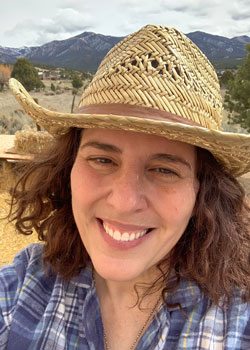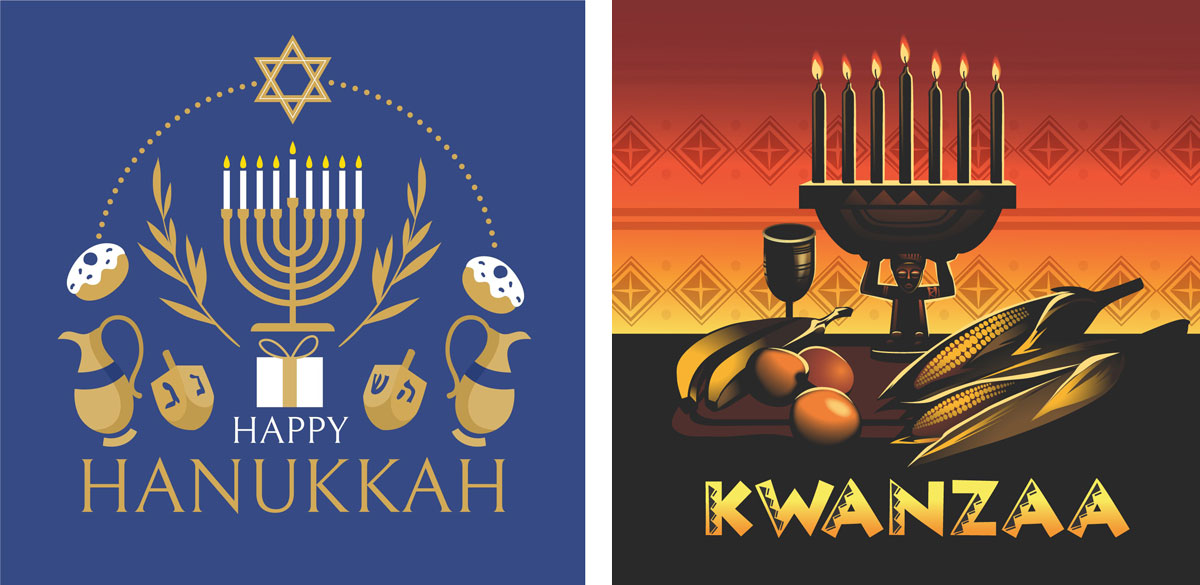
Some complain that wishing people “Happy Holidays” instead of “Merry Christmas” is offensive or indicative of some kind of culture war. As a person of Catholic and Jewish ancestry, wishing people a happy holiday seems to be a kindness and recognition of our strength as a community that takes pride in our diversity. It honors the historical struggles of enslaved people, and their liberation.
Every year, in addition to Christmas, people throughout the United States (and beyond) will celebrate at least two other major festivals: Kwanzaa, which begins on Sunday December 26 and ends on January 1, 2022; and Hanukkah, beginning Sunday November 28 and ending December 6. Being inclusive of cultural traditions such as these is important to diaspora people, those forcibly dispersed from their original homelands.
The word Kwanzaa comes from the phrase “matunda ya kwanza,” which means “first fruit” in Swahili and refers to African harvest festivals. The celebration was created by Professor of Black Studies Maulana Krenga at California State University in 1966, in the midst of violence against Black people during the Civil Rights era. He hoped to create a way for Black communities in the US to recognize a shared African cultural heritage and to renew community ties. He also was responding to the Watts Rebellion (a.k.a the Watts Riots), which began in August 1965 in the mostly Black Los Angeles neighborhood of Watts, after white cops fought with Black residents over a traffic stop that became violent.
While Kwanzaa can be celebrated in different ways, Maulana Krenga created a basic outline that combines the values and traditions of the Ashanti, Zulu, and several other harvest festivals. Families celebrate Kwanzaa over seven nights, and each night a lit candle represents one of seven pan-African principles. These include unity (umoja), self-determination (kujichagulia), collective work and responsibility (ujima), cooperative economics (ujamaa), purpose (nia), creativity (kuumba), and faith (imani). The symbolic colors of Kwanzaa are taken from the Pan-African flag: red symbolizes Shango, the Yoruba god of fire and lightning; black symbolizes humanity, the earth and source of life; and green for the harvest and hope. Although Kawanzaa has a spiritual feeling to it, it is less religious than cultural, and many families combine it with other religious traditions.
Similar to Kwanzaa, Hanukkah is a celebration where candles are lit each night, for eight days. It a Jewish commemoration which means “dedication” in Hebrew and remembers Jewish oppression and rebellion at an historical event: the rededication of the Second Temple in Jerusalem. (The historical event is mentioned in the New Testament in which Jesus attended a “Feast of Dedication.” While the first Syrian king was tolerant of Judaism, his successor outlawed the religion, massacred thousands of Jews, and desecrated the Jewish Second Temple in Jerusalem.
Eventually the Jews threw the Syrians out of Jerusalem, cleansed the temple, and lit the menorah—a sacred 9-branched candelabrum.) The leader of the Jewish rebellion ordered the Temple’s menorah to be kept burning every night to commemorate this event, and this is—Jews believe—when a miracle occurred. There was only enough sacred olive oil in the Temple to keep the menorah’s lights burning for one day, yet the flames somehow continued for eight nights! This is why Hanukkah is also known as the “Festival of Light.”
Although Hanukkah is often referred to by non-Jews as the “Jewish Christmas,” it is a relatively minor holiday in the Jewish calendar, surpassed by high holy days such as Rosh Hashanah (New Year), Passover, and Yom Kippur (Day of Atonement). Yet because it falls near the Christian holiday of Christmas, Hanukkah has become an important annual cultural holiday for Jewish people living in majority Christian regions.
When someone wishes you “happy holidays!” please resist imagining that it’s their “war on Christmas.” Think instead of the light-filled homes of Black Americans and Jewish Americans, alongside the lights of Christmas. Think of overcoming slavery and struggles in new lands. There is room for all at this table.
Author
-

Dr. Caroline Yezer is a cultural anthropologist (PhD Duke University 2007) who has taught anthropology curriculum at College of the Holy Cross and Clark University in Massachusetts.
View all posts



